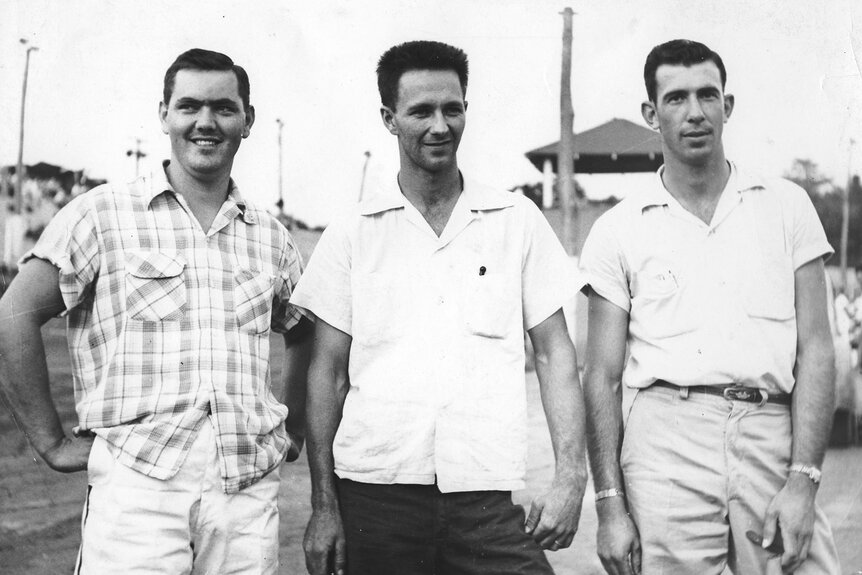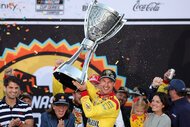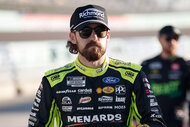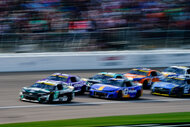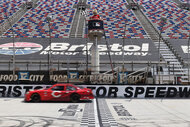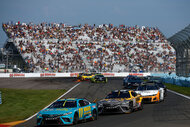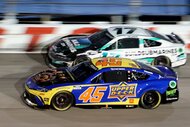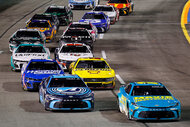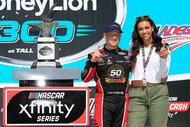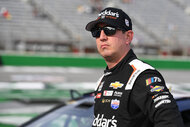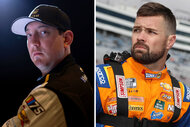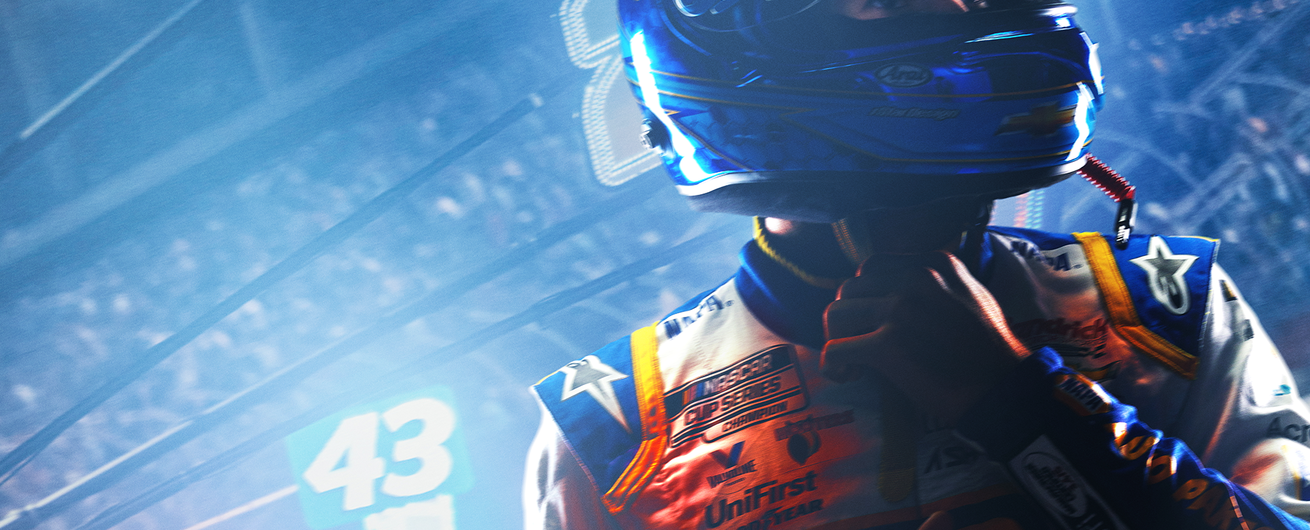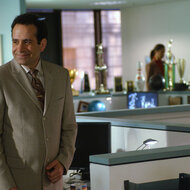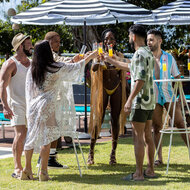Create a free profile to get unlimited access to exclusive show news, updates, and more!
From Back Country Roads To The Speedway: How Bootlegging Shaped NASCAR
Without Junior Johnson and the other unsung heroes who paved the road for league, would it even exist the way we know it?
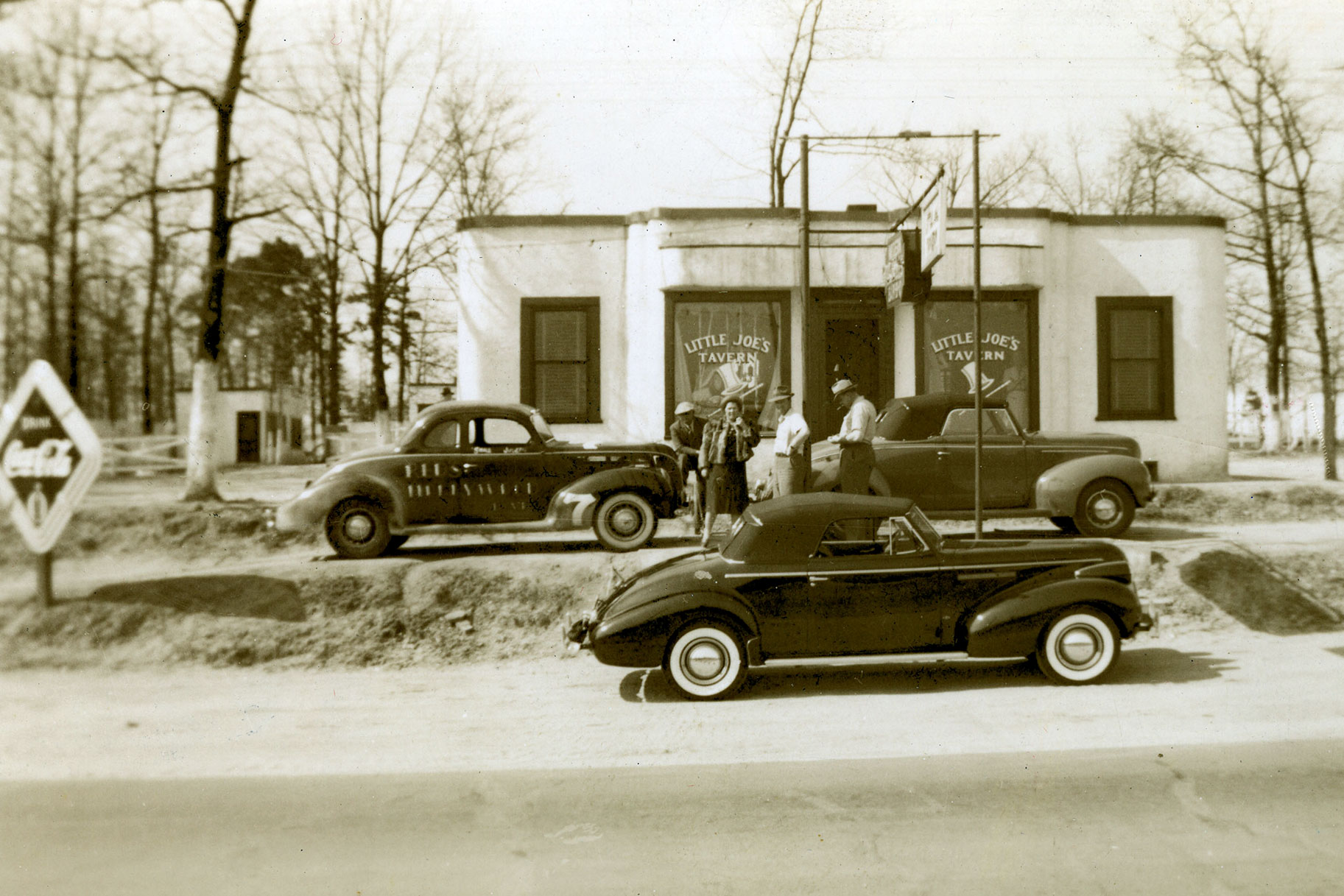
Bull-shouldered with a stout frame that clocked in at 225 pounds, Junior Johnson looked to have more in common with a defensive lineman than a professional race car driver in the 1950s. But that didn't matter much to him. He relished proving people wrong, and his history shuttling carloads of moonshine, firewater and White Lightning around the treacherous, serpentine hairpins of North Wilkesboro, North Carolina, had honed his nerves.
Born in a 1931, still in the days of Prohibition, Johnson had grown up in an environment that prized risk-taking, initiative, resilience, and, yes, a willingness to bend, if not break, the rules. And Johnson excelled, demonstrating intellect, charisma and, above all, drive.
All those attributes spurred him to first become the most one of the most legendary bootleggers of all time, then to become a 50-race winner and later a team owner, to finally landing where he was seemingly always destined to be: the NASCAR Hall of Fame.
If his story, sounds like a familiar Hollywood tale – one that romanticizes the braggadocios, illicit escapades of outlaw antiheroes – kudos for being partially right. Truth is that Johnson’s every bit of the "good ‘ole boy" country hero suggested by his legacy. In fact, Johnson’s fearless racing persona and his origin story as a bootlegger in North Carolina’s Appalachian mountains became so intriguing that Esquire sent some hot, new white-suit wearing writer by the name Tom Wolfe down to Ronda in 1965 to capture the mystique and soul of Johnson, but what he delivered with "The Last American Hero is Junior Johnson. Yes!" managed to capture the hearts of audiences. Years later, the 1973 film version "The Last American Hero" featured compelling performances from both Jeff Bridges and Gary Busey. While Bridges, playing a version of Johnson, oozed his subject's low-key swagger, even utilizing some of Johnson’s signature escape tricks, such as a 180-degree “bootleg” turn and rigging up an imposter siren to fool the “revenuers’ – the liquor agents who tried but often failed to catch Johnson and his contemporaries – it was his portrayal of Johnson’s unrelenting, real-life courage that he and so many other original bootleggers embodied.
More casual fans of NASCAR might not realize just how central bootlegging was to the history of stock car racing in the U.S. Behind bootleggers' wild escapades lay a certain level of bravery, ingenuity and pride in their craft that, still to this day, as NASCAR celebrates its 75th anniversary, mirror the resilient, fearless nature of modern-day racers. It’s that intrinsic need for speed that 2002 Daytona 500 winner Ward Burton credits for helping not only spawn NASCAR but also to provide the heartbeat for the sport in general.
“There’s always been that human nature in all of us to push the envelope ... And at that time, the right man behind the seat with his skills could just flat outrun another individual, particularly if it’s a policeman,” Burton told USA Insider. “Those men and women were trying to make a living at something that was much harder than it was when I came around, but they paved the road for us to make a living racing. Without them, it wouldn’t have been possible.”
Making a living in an era bookended by World Wars was tough for most people in the South, but it was particularly difficult for residents in Western North Carolina where the limited career options comprised of working cotton mills, furniture factories or tobacco farms. Thus, when Prohibition materialized, as detailed by Hall of Fame NASCAR writer and former president of the National Motorsports Press Association Steve Waid, bootlegging emerged as a necessity, allowing runners to make quick cash while performing the critical role of distribution. And that continued even after Prohibition was lifted in 1933.
“The reason the bootleggers existed is because most counties in the South didn’t sell liquor – they were dry,” Waid told USA Insider. “Eventually, the moonshiners learned that the only way to deliver it was to put it in their cars and drive it to their clients. One problem ... Because that liquor was not taxed, the federal government wanted to get the tax money from it, and the law started to chase down the moonshiners. So, the bootleggers figured out that the only way to get the product delivered was to drive it fast, drive it hard and try to hide as much as you can.”
Though he may be best known for dominating the paint for both Dean Smith’s UNC Tarheel basketball squad and the NBA’s Cleveland Cavaliers, co-owner of JTG Daugherty Racing, Brad Daugherty, noted how the turbulent economic conditions in Western North Carolina propelled more and more folks to take part in the illegal enterprise, despite the innate danger.
RELATED: Extreme Motorsports Icon Travis Pastrana Sets His Sights On NASCAR’s Daytona 500
“If you look at [what] those guys did to survive on a daily base economically, and in order to make income, and then they could take it and create a vocation out of it by racing — the fearlessness, the courage and the nerve to utilize that car as a resource, a resource that at any moment you could be put in prison, have the key thrown away and never see the crack of daylight again — it took a lot of nerve, a lot of intestinal fortitude and a lot of drive,” Daugherty told USA Insider.
While the bootleggers’ infamous capers earned them their hard-nosed, legendary reputations, if anyone understands the nuances and complexities of runners like Johnson, it’s Black Mountain, North Carolina native Daugherty, who forged an unbreakable connection with Johnson, beginning when Daugherty was just a kid, playing on Johnson’s bulldozer.
“Junior was one of my best buddies, and [because] I have bootlegging in my family, we’d talk forever about it,” Daugherty revealed. “He was a different cat. He wasn’t beholden to anyone, didn’t play the political game or any of that. He was just himself. If you didn’t like it, then too bad.”
But beneath that hard exterior, Daugherty found a kind, understanding soul in Johnson. Besides always being eager to help Daugherty as he pursued a racing career, part of what drew “The Hooch” to Johnson and cemented their friendship was Johnson’s immediate willingness to look beyond race and support Daugherty’s hero Wendell Scott, a prolific bootlegger in his own right who went on to become the first African American to win a race in the Cup Series.
“He loved Wendell Scott and ... in that era, when intolerance and racism were so prevalent, [Johnson] didn’t care what color you were,” remembered Daugherty fondly. “Junior had to fend for himself, and when you grow up like that, it ain’t Black and White, brother, it’s trying to scrape together enough green with the good Lord watching over you.”
“Yeah, Junior was my guy, and I knew him until the day he died,” continued Daugherty. “I was blessed to know him.”
Daugherty’s not the only one under his company’s banner who reveres Johnson, Scott and other bootleggers.
“They weren’t going down those dirt roads just cruising — they’re white-knuckling every corner as fast as they can, pushing the car to the limit,” Ricky Stenhouse Jr., the 2013 NASCAR Sprint Cup Series Rookie of the Year who races for JTG Daugherty Racing, told USA Insider. “I look back at that and think about how intense that was because everything depended on them getting away, being a better driver and having a better car than the sheriffs. That’s just wild for me to really grasp.”
Like Stenhouse Jr., Spire Motorsports’ wheelman in the No. 7 Chevy Camaro, Corey LaJoie, son of the two-time NASCAR Cup Series champion Randy LaJoie, holds a strong appreciation for the bootleggers who pioneered his sport.
"Back in the day, you could see those guys separate themselves from a crowd by having more courage, bravery and maybe a little less care for the danger and what happens if you make a mistake,” LaJoie noted. “They were ... heroes and stared death in the face. In terms of finding the very nuances of speed ... those guys would throw caution into the wind and just get after it.”
Though speed and the ability to live on the edge were fundamentally crucial to the bootleggers’ identity and eventually modern-day NASCAR, that was only part of the equation
“One of things that developed were after-market parts [such as] carburetors and exhaust manifolds along with methods of boring the cylinders out and working with compression ratios,” Daniel S. Pierce, history professor at the University of North Carolina Asheville and NASCAR historian, told USA Insider. "There were some really sharp people who developed methods for enhancing the performance of the engine and beefing up the suspensions."
But it wasn’t just the innovative mechanics who knew exactly what to do under the hood. The best bootleggers were engineering savants far ahead of their time.
“Junior Johnson came across as slow talking and slow thinking, but he was probably one of the smartest guys I’ve ever known,” Pierce noted. “He was a physics genius.”
That combination of brains and courage are why Stenhouse Jr. and LaJoie hold Johnson and others in such high regard.
“You gotta know where [NASCAR] starts to truly appreciate where you are now,” LaJoie said. “It didn’t just wake up and become what it is now from nothing. It came from [the bootleggers]. That’s where the personalities and ingenuity came from.”
“They laid the groundwork so we could make a better living,” Stenhouse Jr. added. “So, I think it’s very important for us to continue passing down [the history] so that we don’t forget where we came from and how this sport was built.”
Already a titan among men from his bootlegging heroics in his own humble hollers of Western North Carolina, NASCAR provided the stage for Johnson to transcend even that mythical origin, but it was the seminal writing of Tom Wolfe in that 1965 Esquire article that would truly elevate Johnson in modern American folklore, positioning the intrepid trailblazer damn near the threshold of the hallowed halls of immortality.
Then, in 2015, just a few years before both men passed away, with their fates already intertwined for more than half a century, their paths again converged. Though a bit frail, Wolfe still managed to cut the same striking figure in his white wool suit he was known for when they first met in the 60’s while Johnson, a bit paunchier and grayer, still exuded that same country-boy enthusiasm that Wolfe, a Southerner from Richmond, Virginia felt drawn to. Though they ran in totally different social circlesm they'd become legends in their respective fields. And they as they sat together, rehashing the past with all the fondness and care that old comrades would, each wore a sweeping smile plastered across his face – the kind of authentic grin which the harder you try to rein in, the larger it grows. If the love, respect and mutual admiration they shared for one another wasn’t enough proof of their everlasting brotherhood, then Johnson’s appreciative words of Wolfe in that moment surely would be.
“Your article in my bootlegging days is the best thing that ever happened for racing, especially for NASCAR,” a sentimental Johnson revealed to Wolfe in that 2015 encounter. “I think I got more out of it than you did. ... We was both an icon that did our own thing, both of us good things… Yeah, we’ve been friends from then on.”
Can't get enough NASCAR action? Catch up on “Race For The Championship,” on Peacock.
